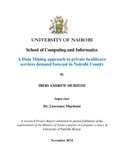| dc.description.abstract | One of the most important indices of defining general welfare and quality-of-life of people in the
world is physical and mental health of individuals. Health care facilities in Kenya have always
aimed to provide health care for all residents using a fair access policy that is characterized by
providing the right service at the right time in the right place. Even though due to computerization,
healthcare industry in Kenya today generates large amounts of complex data about patients,
hospitals resources, disease diagnosis, electronic patient records, and medical devices, there does
not exist an intelligent system that can mine this big data and provide analytical patterns on
healthcare services demand forecast in Kenya. Health care managers and planners therefore must
make future decisions about healthcare services delivery without knowing what will happen in the
future. Forecasts would enable the managers to anticipate the future demand and plan accordingly.
This study aimed at examining Data Mining as an approach to private health services demand
forecast in Nairobi County in Kenya. Data mining was used as it brings in a set of tools and
techniques that can be applied to the big data to discover hidden patterns that provide healthcare
professionals an additional source of services demand forecast knowledge for making decisions.
A supervised Artificial Neural Network-based model for private health care services demand
forecast was developed. A prototype was then developed from the model and its performance
evaluated by applying the actual private services demand data from the DHIS2 Kenya system to
predict the demand for 3 years in advance. The model was trained under the WEKA environment
and predicted the demand for health services in various categories for private health care providers
in Nairobi county Kenya. The test results showed that the forecast year-by-year approach was more
suitable and efficient for years ahead demand forecasting. Forecast results demonstrated that the
model performed remarkably well with increased number of actual data and iterations. Artificial
Neural Networks model gave a more accurate forecast results with 4% Mean Percentage Error as
compared to alternative methods of demand forecasting whose error was above 6%.
The established private health care demand forecast model gives the health service providers
optimal decisions they can make today about the private healthcare business tomorrow.
Key Words: Data Mining, Artificial Neural Network, ANN, Forecast, Private Health Care,
Decision Making, WEKA, Linear Regression, Time Series | en_US |

